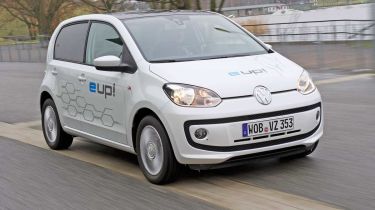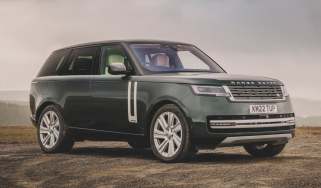Volkswagen e up!
We get behind the wheel of the pioneering electric city car

This electric up! feels almost ready for the showroom. It’s fast, smooth and easy to drive – it should be an ideal city car. It also recharges far quicker than other electric cars already on sale. While it shows a lot of potential it’s likely to be much more expensive than the petrol up!, which is already incredibly efficient and can travel long distances with ease.
The up! range also includes an electric car in the shape of the e up!, which debuted at 2009’s Frankfurt Motor Show. Testing of the prototype – which we drove – is now so advanced, VW says a production version will go on sale in the middle of 2013.
Video: Watch CarBuyer's video review of the VW up!
[[{"type":"media","view_mode":"content_narrow","fid":"68821","attributes":{"alt":"","class":"media-image"}}]]
The e up! uses essentially the same set-up as the Golf Blue-e-motion concept – an 80bhp electric motor teamed with a lithium-ion battery. But the up! will reach customers first. As with all electric cars, the VW is very easy to drive. Select D on the auto shifter and off you go. We found performance was strong, with 210Nm of torque – 37Nm more than the up! GT – propelling the prototype from 0-60mph with ease. The motor doesn’t make much noise, either; simply a hum and a whirr.
You can also increase the level of brake energy recovery, and the car slows markedly when you lift off the throttle. The e up! uses a purpose-built platform, with the battery located under the floor. It’s very well packaged and has the same passenger and boot space as the petrol car. The downside is that it weighs 200kg more, which certainly dulls its reactions in corners.
While the Nissan Leaf takes at least nine hours to fully charge, the e up! needs only five-and-a-half – or 30 minutes if using a fast charger. VW engineers say a range of up to 90 miles is possible on a single boost.
The interior of our prototype is pretty representative of the final model. Its dashboard gets a charge gauge, while the portable sat-nav will have apps that pinpoint the nearest charging stations and show the car’s remaining range.
There will also be some modifications to the exterior, potentially including a new front grille to mark the e up! out from the standard car.



